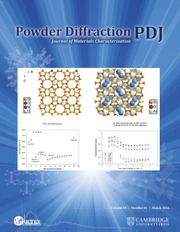Crossref Citations
This article has been cited by the following publications. This list is generated based on data provided by
Crossref.
Scholz, Fritz
and
Kahlert, Heike
2006.
Encyclopedia of Electrochemistry.
Martínez-Garcia, R.
Knobel, M.
and
Reguera, E.
2006.
Thermal-Induced Changes in Molecular Magnets Based on Prussian Blue Analogues.
The Journal of Physical Chemistry B,
Vol. 110,
Issue. 14,
p.
7296.
Martínez-García, R
Reguera, L
Knobel, M
and
Reguera, E
2007.
Magnetic interaction between manganese (2+) atoms through aquo bridges and bifurcated cyano groups.
Journal of Physics: Condensed Matter,
Vol. 19,
Issue. 5,
p.
056202.
Kumar, Amit
Yusuf, S. M.
Keller, L.
Yakhmi, J. V.
Srivastava, J. K.
and
Paulose, P. L.
2007.
Variation of structural and magnetic properties with composition in the(CoxNi1−x)1.5[Fe(CN)6]∙zH2Oseries.
Physical Review B,
Vol. 75,
Issue. 22,
Rodríguez-Hernández, Joelis
Gomez, Ariel
and
Reguera, Edilso
2007.
Crystal structures of hexacyanometallates with bifurcated cyano groups.
Journal of Physics D: Applied Physics,
Vol. 40,
Issue. 19,
p.
6076.
Gómez, A.
Rodríguez-Hernández, J.
Kycia, S.
and
Reguera, E.
2007.
Bifurcated CN Group in Hexacyanometallates, the Case of Cd2[Fe(CN)6]. Structure Determination from a Combination of RDF and Direct Methods.
Zeitschrift für Physikalische Chemie,
Vol. 221,
Issue. 8,
p.
1049.
Avila, M.
Reguera, L.
Vargas, C.
and
Reguera, E.
2009.
Tetrahedral coordination for Zn in hexacyanometallates: Structures of Zn3A2[M(CN)6]2·xH2O with A=K, Rb, Cs and M=Ru, Os.
Journal of Physics and Chemistry of Solids,
Vol. 70,
Issue. 2,
p.
477.
Adak, Sourav
Daemen, Luke L.
Hartl, Monika
Williams, Darrick
Summerhill, Jennifer
and
Nakotte, Heinz
2011.
Thermal expansion in 3d-metal Prussian Blue Analogs—A survey study.
Journal of Solid State Chemistry,
Vol. 184,
Issue. 11,
p.
2854.
Gil, Diego M.
Avila, Manuel
Reguera, Edilso
Pagola, Silvina
Inés Gómez, M.
and
Carbonio, Raúl E.
2012.
Lead hexacyanoferrate(II) tetrahydrate: Crystal structure, FTIR spectroscopy and thermal decomposition studies.
Polyhedron,
Vol. 33,
Issue. 1,
p.
450.
Alexandrov, Eugeny V.
Virovets, Alexander V.
Blatov, Vladislav A.
and
Peresypkina, Eugenia V.
2015.
Topological Motifs in Cyanometallates: From Building Units to Three-Periodic Frameworks.
Chemical Reviews,
Vol. 115,
Issue. 22,
p.
12286.
Reguera, Leslie
López, Noeldris L.
Rodríguez‐Hernández, Joelis
Martínez‐García, Ricardo
and
Reguera, Edilso
2020.
Hydrothermal Recrystallization as a Strategy to Reveal the Structural Diversity in Hexacyanometallates: Nickel and Copper Hexacyanoosmates(II).
European Journal of Inorganic Chemistry,
Vol. 2020,
Issue. 18,
p.
1763.
Avila, Yosuan
Acevedo-Peña, Próspero
Reguera, Leslie
and
Reguera, Edilso
2022.
Recent progress in transition metal hexacyanometallates: From structure to properties and functionality.
Coordination Chemistry Reviews,
Vol. 453,
Issue. ,
p.
214274.
UlAin, Qurat
Ali, Sarmed
Jamil, Saba
Bibi, Shamsa
Rauf Khan, Shanza
UrRehman, Shafiq
Bibi, Guria
Khan, Tahreem
Shehroz, Hamza
Hashaam, Muhammad
and
Janjua, Muhammad Ramzan Saeed Ashraf
2022.
Comparison of catalytic and fuel additive properties of bimetallic nanoparticles and its composite: FeMnO3 and PANI-FeMnO3.
Materials Science in Semiconductor Processing,
Vol. 144,
Issue. ,
p.
106630.
Chandra Reddy Niragatti, Suma
Thupakula Venkata Madhukar, Sreekanth
Kim, Jonghoon
and
Yoo, Kisoo
2024.
Highly stable polyvinylpyrrolidone-encapsulated potassium-rich manganese hexacyanoferrate as cathode materials for aqueous zinc ion batteries.
Journal of Power Sources,
Vol. 613,
Issue. ,
p.
234852.
Hu, Qiao
Liao, Jiaying
Yao, Jianfeng
Du, Yichen
and
Zhou, Xiaosi
2024.
Regulating the thermostability of metal hexacyanoferrates for highly-efficient alkali metal ion storage.
Journal of Energy Storage,
Vol. 101,
Issue. ,
p.
113950.
Wang, Xin
Zang, Xufeng
Hu, Chunyi
Li, Jiazhan
Cui, Bo
and
Fang, Yishan
2025.
Cutting-Edge Exploration of a Molecularly Imprinted Polymer-Coupled Electrochemiluminescence Mechanism Based on Organic Cation Side-Chain Construction for the Identification and Detection of Escherichia coli O157: H7.
ACS Sensors,
Vol. 10,
Issue. 6,
p.
4105.

